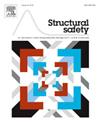An Adaptive Gaussian Mixture Model for structural reliability analysis using convolution search technique
IF 6.3
1区 工程技术
Q1 ENGINEERING, CIVIL
引用次数: 0
Abstract
Non-parametric probability density estimation has gained popularity due to its flexibility and ease of use without requiring prior assumptions about distribution types. Notable examples include Kernel Density Estimation, Gaussian Mixture Model (GMM), the Mellin transform, and the Generalized Distribution Reconstruction (GDR) method, etc. However, these methods can encounter issues such as tail oscillation and sensitivity to initial guesses, particularly in the context of structural reliability analysis. To improve accuracy, this paper proposes an Adaptive Gaussian Mixture Model method. This method uses the inverse Fourier relationship between the Characteristic Function (CF) and the Probability Density Function (PDF), combined with a convolution search technique for parameter estimation. First, a more accurate expression for the CF is introduced, where the undetermined parameters are specified based on the numerically estimated CF curve. Then, a convolution search domain is developed to determine these parameters, including weight coefficients, mean domain, and standard deviation domain. Compared to the conventional methods for parameter estimation, the proposed convolution search technique can effectively avoid the problems of overfitting and initial parameter sensitivity. Using these parameters, the PDF is reconstructed and evolves into an Adaptive Gaussian Mixture Model. Numerical investigations are conducted to validate the efficacy of the proposed method, with comparisons made to the Mellin transform, GDR, Classic GMM, and other parametric methods.
利用卷积搜索技术进行结构可靠性分析的自适应高斯混合模型
非参数概率密度估计因其灵活性和易用性,无需事先假设分布类型而广受欢迎。著名的例子包括核密度估计、高斯混杂模型(GMM)、梅林变换和广义分布重构(GDR)方法等。然而,这些方法可能会遇到尾部振荡和对初始猜测敏感等问题,特别是在结构可靠性分析中。为了提高准确性,本文提出了一种自适应高斯混合模型方法。该方法利用特征函数(CF)和概率密度函数(PDF)之间的反傅里叶关系,结合卷积搜索技术进行参数估计。首先,引入更精确的 CF 表达式,根据数值估计的 CF 曲线指定未确定的参数。然后,开发了一个卷积搜索域来确定这些参数,包括权系数、均值域和标准偏差域。与传统的参数估计方法相比,所提出的卷积搜索技术能有效避免过拟合和初始参数敏感性的问题。利用这些参数,PDF 将被重建并演化为自适应高斯混合模型。通过与梅林变换、GDR、经典 GMM 及其他参数方法的比较,我们进行了数值研究以验证所提方法的有效性。
本文章由计算机程序翻译,如有差异,请以英文原文为准。
求助全文
约1分钟内获得全文
求助全文
来源期刊

Structural Safety
工程技术-工程:土木
CiteScore
11.30
自引率
8.60%
发文量
67
审稿时长
53 days
期刊介绍:
Structural Safety is an international journal devoted to integrated risk assessment for a wide range of constructed facilities such as buildings, bridges, earth structures, offshore facilities, dams, lifelines and nuclear structural systems. Its purpose is to foster communication about risk and reliability among technical disciplines involved in design and construction, and to enhance the use of risk management in the constructed environment
 求助内容:
求助内容: 应助结果提醒方式:
应助结果提醒方式:


